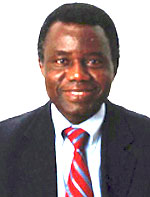Prof. Adekunle Hakim Dawodu
UAE Awards
Hamdan Award for Original Research Paper Published in Emirates Medical Journal
2005-2006
Professor Adekunle Dawodu is a Professor of Pediatrics and Director of International Patient Care and Education, International PHealth Program, Cincinnati Children's Hospital Medical Center and University of Cincinnati, Ohio. He received his medical degree from the University of Ibadan Nigeria.
He received his pediatric and neonatology training at Alder Hey Children's hospital and Aberdeen Maternity and Children's Hospital in the United Kingdom and in Cincinnati Children's Hospital Medical Center, USA. He has had extensive professional, teaching, research and administrative experience in Child Health and Neonatology in Nigeria, United Kingdom, and recently in the Middle East. Before joining Cincinnati Children's Hospital Medical Center in August 2004, he was on the staff of the Faculty of Medicine and Health Sciences of the United Arab Emirates University where, for 5 years he was Professor and Chair of the Department of Pediatrics and Director of Clinical Training and the Certifying Examination of the Medical School. He is an author of more than 100 publications in peer-reviewed journals.
The award winning paper which Prof. Dawodu et al published highlights an important health issue, namely rickets in Emirati children. One doesn't see as many children with rickets today as in the past in the rest of the world. In a country with a lot of sunshine almost throughout the year, presence of rickets must be cause for concern. In this study, the authors had 40 children with rickets who also had significant skeletal deformities, growth and motor development delay; and all had vitamin D deficiency.
Clinical features of children with 'moderate/severe' vitamin D deficiency were similar to those with 'very severe' vitamin D deficiency. The median serum alkaline phosphates concentration was higher in the latter. Sixteen mothers (40%) had 'very severe' vitamin D deficiency and 68% were not exposed to sunlight. Maternal body surface area exposed to sunlight correlated with serum 25-OHD. Authors conclude that rickets was mainly due to severe vitamin D deficiency. Maternal sunshine exposure that ensures adequate vitamin D status should be emphasized in the strategies to eliminate rickets.
The finding in this meticulously done study of the existence of a condition formerly thought to be uncommon highlights a possible health issue that needs serious consideration by the authorities of introduction of Vitamin D supplements in commonly consumed food in the Emirates. Therefore this paper is recommended for the EMJ award 2006.

